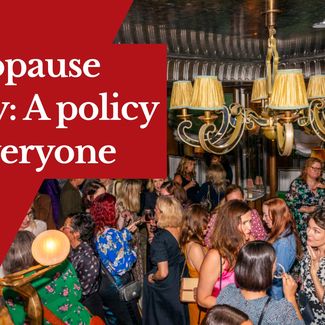
WACL introduces new Menopause Policy under ‘Be a Women’s Health Hero’ Initiative
The policy accelerates WACL ambitions of having 50 per cent of CEO roles filled by women in the industry
19 October 2023
On the World Menopause Day, October 18, WACL has launched a Menopause Policy for the industry to adopt and or adapt to better support women progress in their careers and realise their full potential.
The new menopause policy is based on and updated from Dark Horses’ landmark open-source menopause policy, taking into account growing awareness of both menopause experiences and support strategies.
It is the first in a series of tools WACL is developing as part of a new initiative called ‘Be a Women’s Health Hero’ to address the four main life-changing challenges for women: periods, fertility, maternity and menopause. The idea is to provide companies with a menopause policy to adopt or use as a practical reference tool to ensure whatever they do is fit for purpose.
While it is relatively well accepted now that women have more complex health needs throughout their careers, these health conditions still remain one of the biggest barriers to women progressing. Most working women aged 40 to 60 have experienced symptoms related to menopause transition, and over half have been unable to go into work at some point due to menopause, according to a Chartered Institute of Personnel and Development report published in early October.
One in 10 women who have worked while going through menopause have left a job because of their symptoms, according to another study, which also found that 14 per cent of women have reduced their hours at work, 14 per cent have gone part-time, and 8 per cent have not applied for promotion because of the menopause.
Further, a staggering 25 per cent of perimenopausal or menopausal women are considering leaving their careers. On top of which, women from different ethnic groups can have differing experiences of menopause.
The net effect – the loss of experienced women in business or those who stay underperforming due to their unmet health needs – is bad both for individuals and the companies they work for. Yet despite this – and the fact that workplace support for women during menopause makes a considerable and positive difference – the CIPD found just 24 per cent of those surveyed said their organisations have a stated menopause policy or other support in place; 43 per cent said their organisations didn’t, and a third said they don’t know.
In advertising and marketing, the situation is little better. When asked for a recent Advertising Association 2023 All in Census if their company has a menopause policy, 64 per cent of respondents replied, “I don’t know”. Further, 56 per cent of respondents believed their company would benefit from menopause awareness training. The lack of awareness, provision, and education these figures show is something WACL is now determined to remedy.
Nishma Patel Robb, President of WACL and Senior Director, Brand and reputation Marketing at Google, says: “Although there are pockets of progressive cultures trying to support women through these life-changing health challenges, progress just isn’t quick or robust enough. We believe in tangible change, which is why we are providing tangible solutions, such as this new Menopause Policy, to help the industry address the challenges women face and accelerate having 50 per cent of CEO roles filled by women in the industry.”
Kate Rowlinson, Chief Executive Officer of EssenceMediacom UK and WACL member, says: “At EssenceMediacom we believe it is imperative we support women in a way which is tailored to them. Our coaching programme has been a huge success, catering for the fact that menopause affects women in many different ways and allowing us to keep women in the business who we may have lost – 40 per cent of the senior women who took part in our programme on overcoming the impact perimenopause can have on performance were promoted, for example. Knowing support is available reassures women that they are heard and included in the organisation.”
Over the next 12 to 18 months, ‘Be a Women’s Health Hero’ will help companies work with women to identify the specific health challenges they face in the workplace by providing tangible support and action plans for companies – from access to policies like the menopause and guidance around communications to support on how to de-stigmatise and how to implement behaviour change.
It will give women the confidence to take the time off they need without fear of being penalised. It will empower them to secure women-centric policies within their organisation and ensure training for colleagues to be allies.





